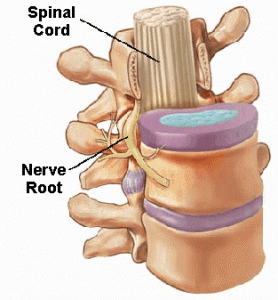 Over the years, I can’t count the number of times I heard someone say that they’ve never been to a chiropractor because they’ve never “needed” it. I mentioned this to an online friend who asked me what I meant since she’d never needed it, and had therefore never been to a chiropractor herself.
Over the years, I can’t count the number of times I heard someone say that they’ve never been to a chiropractor because they’ve never “needed” it. I mentioned this to an online friend who asked me what I meant since she’d never needed it, and had therefore never been to a chiropractor herself.
Aha! Here was my chance to explain this kind of care to someone who had no idea what its value is beyond the treatment of injury or pain. Why does the chiropractor to the New York Giants football team say that his busiest time is right before the team goes out onto the field?
I wrote her the information that I’ve been telling all my new patients for the past year, so if you’ve seen me recently, this might be familiar. If you’ve never seen me, read this to understand how I can improve your health… and if you’ve seen me in the past, is any of this new to you?
Any part of your body that is dealing with a problem, whether it’s your stiff neck, achy lower back, or your knee or wrist, contains these four elements:
- Muscle
- Bone
- Inflammation
- Nerve
Even though chiropractors are famous for caring for your skeleton, our main area of focus is your nervous system (NS). Our job is primarily to “tune up” your NS. We think of ourselves of “Nervous System Doctors.” Why? Your NS, which is comprised of your brain, spinal cord and nerves, controls and regulates all the other systems of your body.
For you to be healthy, your brain needs to be able to communicate with the rest of your body. Your NS controls the proper functioning of your digestive system, which impacts your health. It controls your immune system, which obviously impacts your health. And it controls your respiratory system, muscular system, and your reproductive system!
When your NS is diminished, or is under stress, it effects your health overall. When your NS has stress removed, it can function at its best, and your overall health improves. People usually come to me with a musculoskeletal complaint, but after some treatment, they tell me, “Now I get over colds faster,” or “I don’t need as much asthma or allergy medication.” They say, “Now my sleep cycle is more regular” or “my menstrual cycle is more regular.”
But let’s go back to where your issues typically begin:
1. Muscle
Muscles contract. It’s what they do. In fact, your brain can tell them to contract, but not to lengthen. In order to stretch a muscle, your brain has to tell another muscle, an antagonist muscle, to contract. That’s all they do is contract, contract, contract. When you’re stressed out, they tense up. When you exercise (a healthy form of stress) they tense. So unless you’re doing an awful lot of stretching and getting a lot of massage, your muscles are tending to get tighter and tighter.
2. Bone
Every muscle in your body attaches to two or more bones. That means that when you develop any muscle tension anywhere, your skeleton is affected. If the muscle tension is on one side, it’ll pull your bones unevenly and you’ll be misaligned, but if your tension is equal on both sides of your body, you won’t necessarily be misaligned, but your bones will be compressed. They will be stuck, or immobile. This is the main thing I am looking for when I check people’s skeletons. Muscle tension causes compression of joints, which is irritating. And your body has a universal response to irritation: Inflammation.
3. Inflammation
Whether your problem is stuck joints, an invading bacteria, or an obstructed bowel, your body always responds with inflammation. It’s a defense mechanism that is good in the short run, but not so good in the long run. Your body is trying to “wall off” the problem area by drawing fluid to it. The fluid is filled with healing agents such as histamine, cytokines, & bradykinin, but these components alter the electrical conductivity in that region of your body, acting like a mini electrical storm. When this is present around the joints of your spine, it diminishes the nerve impulses traveling through it to the rest of your body.
4. Nerve
That reduced nerve function impacts all the other parts of your body. It’s subtle at first, and then gradually gets more and more severe. People get used to the new level of decreased function so if you’re waiting to feel like you “need it,” that would be as ineffective as waiting until you feel like you need a teeth cleaning.
You never notice the imperceptible amount of plaque that builds up on your teeth each day, but you can really notice the difference when you’ve just gotten your teeth professionally cleaned. It’s the same with chiropractic treatments. You may walk in feeling like everything’s just fine, but once you get your tune-up you walk out feeling like a “million bucks.”
This is why it makes sense to treat children. I’m not waiting for them to have an episode of “back pain” for me to treat. I’m actually “tuning up” their NS so that their immune function and digestion are optimized right then and there. That’s what Wellness Care is all about.
What is a treatment?
In my office, treatment begins with addressing the muscle tension. If I massage the (1) muscles first, then when I address the (2) bones, (3) inflammation and (4) nerve, the muscles won’t be compressing things right back to the way they were as quickly.
Then, I locate the joints that are relatively immobile, and mobilize them with an impulse that we call “giving an adjustment.” That impulse can be a strong force, as when I’m adjusting the low back of an adult, but it may also be very gentle, as when I’m adjusting someone’s neck or any part of a child.
The impulse creates movement, which stimulates the receptors within the joint (as well as within the surrounding muscles) to tell your brain “everything is OK. There is no more need to cause muscles to tighten, or tissues to be inflamed.” Those beneficial effects are instant, and people tell me as they are walking out that they feel wonderful. Have you had your “tune-up” this month?
